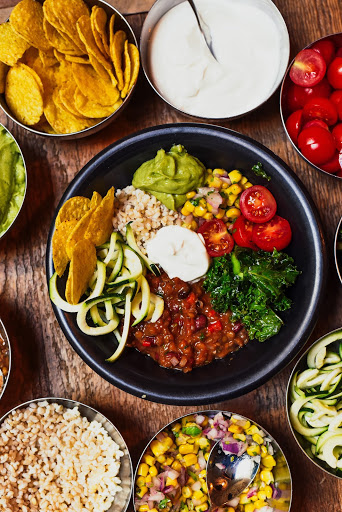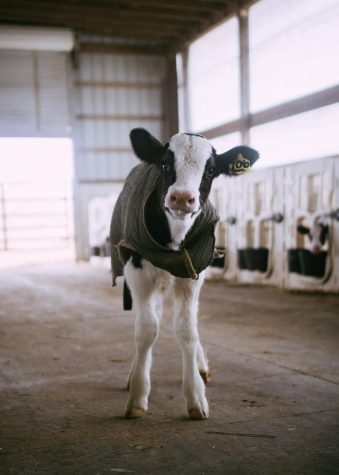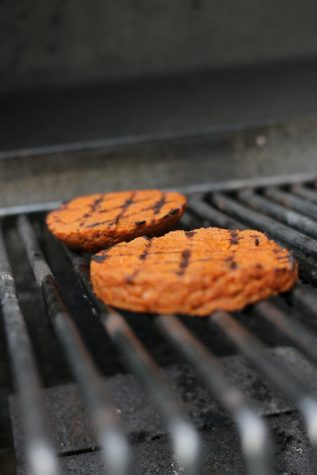Consider the Cow: Why You Should Be a Vegetarian

Ralph ‘Ravi’ Kayden (Unsplash)
Vegetarian diets still offer a wide variety of nutrients and flavors.
March 17, 2021
Zucchini doesn’t scream when you kill it.
Warning: Don’t read any further if you don’t enjoy gore or inhumane conditions. Or do. Because this is real life, and it can’t be ignored.
Cows may not scream as their legs are sliced from their bodies, conscious all the while, but should screams really be the measurement of inhumane treatment?
Don’t get me wrong. Nothing beats the taste of a juicy, spiced burger, or still sizzling bacon lined with fat.
But how might your perspective change if you’re the one making the kill? While there are some who I’m sure would be more than willing to chop up and piece out innocent creatures, I’m betting many wouldn’t exactly find the task pleasurable. I mean how could you?
According to PETA, those who complete the grueling kill for us have to move quickly, at the expense of the cow. Longtime slaughterhouse worker Ramon Moreno told The Washington Post of his own experience slaughtering fully conscious cows. “They die piece by piece.”
Many of the laborers realize this cruelty, and yet continue working. Why?
A significant number of the employees at slaughterhouses and meatpacking industries are immigrants, at risk of losing their already low-paying jobs by speaking against the system.
If there were no meatpacking industries in the first place, rather more fruit and vegetable companies, there would be no reason for these workers to silently live with the guilt of slaughtering innocents.
We have people that work hard for us so we can eat such scrumptious goods. We don’t have to watch the physical killing, the blood spraying — we don’t have to hear the noises that fill slaughterhouses as animals die by the hundreds.
We hear about such treatment, and think about how sad it must be, and go to hug our puppies and kittens that are chopped up in the same way in other countries. We hide behind artificial names: we eat ‘Pork’, not pigs, we eat ‘Steak’, not cows.
Cows are cute. Steak is delicious.

(Amber Kipp, Unsplash)
Isn’t that the definition of greed? Conveniently forgetting how much we love cute farm animals just to shovel them into our mouths?
Yes, humans have been consuming meat for millions of years. But the science of evolution that applies to the adaptation of humankind can apply just as well to the change in diets. Human teeth are now naturally duller, and we even depend on the fibers in plants to help break down meat.
I know I sound like one of the preachy, wannabe superior vegetarians imposing my belief system on you. Surprising as it is, not even one year ago I was making fun of the very people I’ve seem to become. Meat is quite delicious.
But as my teeth tear into tender meat, I can’t help but picture the innocent creature it used to be, and the science that points to solving global issues by going vegetarian.
As reported by PETA Prime, it takes roughly 13 pounds of grain for 1 pound of meat to be produced.
Malnutrition affects an estimated 870 million people worldwide and accounts for the deaths of over 2.5 million children under 5 years old every year. But sure! Why shouldn’t their sustenance be kept away from them for a smaller food output rate that leads to dead animals? Makes sense.
Some have suggested switching to feeding livestock with grass. After all, it’s healthier for humans to eat grass-fed animals.
This poses even more problems, however, leading to clearing out unique ecosystems of the earth, pushing indigenous people off of their already dwindling lands, and destroying rainforests. Add to the fact that the time required to wait for the grass to grow would be too long, in the meantime having nothing to feed the massive amount of livestock sprawled across the globe.
Let’s be honest, meat is a fabulous source of protein. Allina’s Health Patient Education Department reports that with just ½ cup of ham or ground beef, you can consume 28 grams of protein. Even more comes with chicken.
Protein is indeed a vital nutrient to sustain life, but there are other adequate sources. How else have vegetarians lived so long, longer than average, I might add, than meat-eaters?
According to Medical News Today, half a cup of tofu provides 10 grams of protein, half a cup of tempeh contains 15 grams of protein, and just half a cup of peanuts offers 20.5 grams of protein. These are just a few of the many alternatives for required vitamins and nutrients when meat is cut out of the diet.
In addition to accessible alternatives, a vegetarian diet reduces the risk of heart disease-related deaths by 40%, according to Medical News Today.
I’ll admit that dairy and eggs are a part of my daily consumption. While I understand the benefits of the world converting to veganism, it’s not a feasible option with the number of meat-eaters and the cheaper access to animal products.
Can we meet halfway?
Cut out meat. If you can, go full-blown vegan! I’d applaud you.
Just always remember to consider the cow. Consider the people in need of food. Consider the workers in harsh conditions. Consider the benefits of vegetarian diets. And consider the harm of meat.
Perform every action with purpose, knowledge, and confidence, and make the decision that you know will most positively impact the world.
Humane slaughter is an oxymoron. It’s not possible.



